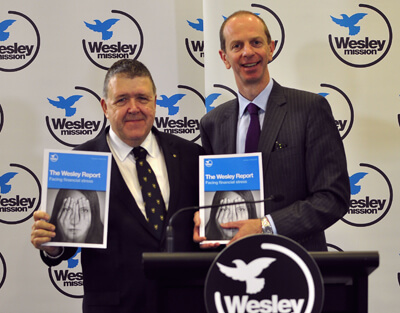A growing number of New South Wales households are suffering “financial stress”, according to a new Wesley Mission report released this week.
The report, based on research conducted in December last year, found that 44 per cent of NSW households were suffering financial stress in 2014, up from 37 per cent in 2010, while 38 per cent were spending more than they earnt, representing an increase of seven per cent on the 2010 figure.

Launching the latest Wesley Mission report on financial stress: CEO of Wesley Mission Rev Dr Keith Garner and Australian Securities and Investment Commission deputy chair Peter Kell
The research also showed that the proportion of households unable to keep a budget has risen five points since 2010 to 19 per cent.
Wesley Mission CEO Rev Dr Keith Garner said it was a “telling reality” that almost four in 10 households in NSW “are now technically insolvent”.
“Households are simply not living within their means and are unable to save money,” he said, adding that with no savings to fall back on when illness or misadventure hits, “hardship usually follows”.
The Wesley Report: Facing Financial Stress said the growing number of people in financial stress “is not surprising” given large increases in household-related expenses.
It cites Consumer Price Index data showing that between 2008 and 2013 consumer electricity prices rose by 83 per cent, water costs by 63 per cent and gas prices by 57 per cent. It also says that between 2006 and 2011, Australian consumers were spending at least 30 per cent more on health insurance, medical and health expenses, utilities, mortgage repayments and education.
The report said that while financial stress can affect people at all income levels, its effect is most profound on those on lower incomes. Data from research – which included an online survey conducted by Urbis – showed that households most likely to be suffering from financial stress included those with an income of $52,000 a year or less, those where the main source of income is from government benefits, those which reported a decline in annual income over the past 12 months, those which reported spending more than they earn and those which roll credit card debt and are unable to pay this off on a monthly basis. Women are more likely to be from households suffering financial stress than men.
The report also shows that financial stress has a “significant impact” on households, including effects on physical and mental health, relationships, and social and community engagement. It shows that of those who experienced financial stress in 2014, 28 per cent indicated it had resulted in a diagnosed mental illness, 31 per cent said it had caused sickness or physical illness and 28 per cent said it had resulted in relationship issues with family or friends.
In addition, 18 per cent indicated that they had difficulty at work or had lost a job as a result of their experiences of financial stress while 15 per cent said they had drunk alcohol excessively, five per cent said they had used unprescribed prescription drugs and three per cent had used illicit drugs – all as a result of financial stress.
Wesley is calling for more effort to be put into helping people find pathways to simple money management advice and planning, for the implementation of a broader approach to financial education and counselling, and for greater awareness of the implications for women in financial stress.
In a speech at the launch of the report this week, Rev Dr Garner said it was “time for us to recognise that financial health is also important for physical and mental wellbeing”.
“The evidence before us today in this Wesley Report only underlines the fact that such concerted action is needed more than ever. The costs to individuals, the community and governments are far too great.”
You can download a copy of the report here.





